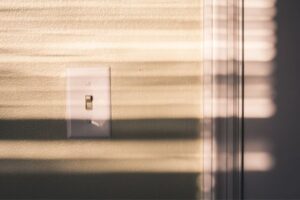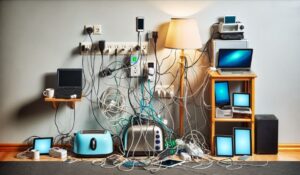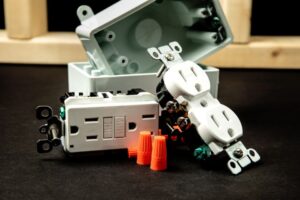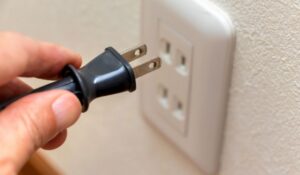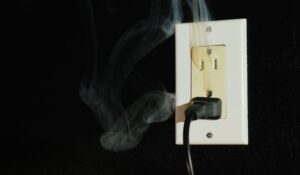Flickering light bulbs can be annoying, but is there really cause for concern? Most commonly, home owners or business owners will wonder if flickering lights are dangerous or can cause a business or house fire. We hope to provide some practical tips to troubleshoot the issue, as well as help you determine when to call an electrician.
In most cases, a flickering light bulb simply indicates that the bulb is on its way out. However, if the flickering is persistent and accompanied by other signs like dimming or crackling sounds, it could be a sign of an electrical issue. If you’re ever unsure, it’s best to err on the side of caution and call an electrician.
Below, we’ll dive into some troubleshooting steps you can take at home:
What causes flickering lights
Flickering lights are caused by a fluctuation in the total voltage in a building, home, or business. Practically speaking, this can have a few different causes. Most of the time, it’s simply due to a lightbulb that’s on its way out. As the filament inside the bulb wears down, it becomes less able to conduct electricity, which can cause it to flicker. However, flickering light bulbs can also be caused by:
- Loose lightbulbs
- Old electrical panels or breaker boxes
- Loose sockets, dimmer switches, or wiring
- Outdated wiring
- Debris in the socket
- Using the wrong type of bulb
- Overloaded circuits
While a flickering lightbulb is usually nothing to worry about, persistent flickering could be a sign of an electrical issue.
What to do if you do experience lights flickering
If your lightbulb is flickering, the first thing you should do is check to see if the bulb is loose. If it is, simply tighten it and see if that solves the problem. If the flickering persists, try replacing the bulb with a new one. In most cases, this will solve the issue.
If these things do not solve the problem, assess whether the flickering is persistent or not – does it happen every time you turn the light on, or just sometimes? Is there a certain appliance that causes lights to flicker when it’s turned on? Is the flickering severe enough that you always notice it, or is it barely noticeable? Is it accompanied by a buzzing light switch?
The answers to these questions can help you diagnose the issue, as well as provide good information to an electrician if you decide to bring someone in to help with the issue.0
How to prevent flickering lights from happening in the first place
There are a few things you can do to help prevent flickering lights:
- Use the correct lightbulb for your socket. Different types of bulbs require different amounts of power, so using the wrong type of bulb can put stress on the socket and cause flickering.
- Keep your lightbulbs clean. Dust and debris can build up on lightbulbs and sockets, which can cause flickering.
- Clean the socket. Turn the power off and remove the bulb to clean.
- Don’t use too many lights at once. If you’re using multiple light fixtures, make sure not to overload the circuit. Too much demand on the electrical system can cause flickering.
How to determine whether you should worry about flickering lights
If you notice that your lights are flickering even when the bulb is new and tight, it’s possible that there’s something wrong with the socket. One way to be sure about the integrity of your systems is to get an electrical inspection of the systems in your home.
In general, you should only be concerned about flickering lights in your home or business if they’re accompanied by other signs of an electrical issue, like dimming or crackling sounds. If you notice burning smells, this can be a sign that electrical fires may result – turn the power off and call an electrician.
When it’s time to call in a professional electrician for help
We hope the above information has been helpful. Most of the time, these simple tips will take care of the problem. However, if you’ve noticed any of the warning signs mentioned above, we’d advise you to call an electrician that’s local to you. They’ll help you diagnose the issue, and potentially come out to inspect the property and provide electrical services if necessary.




